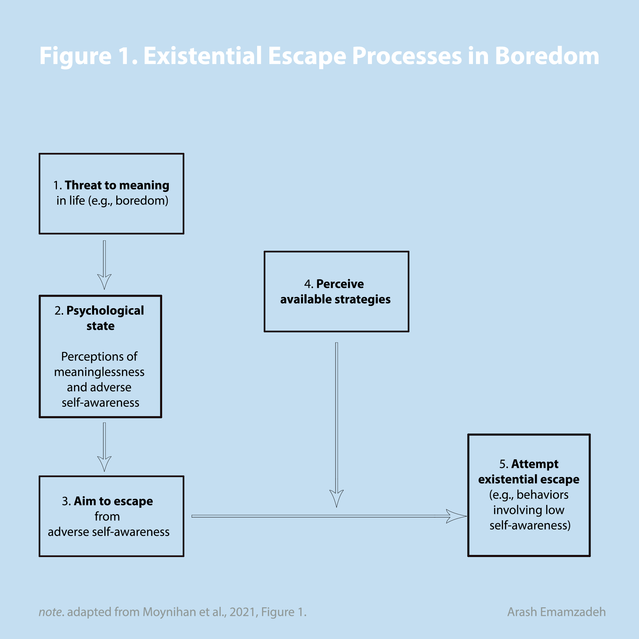Boredom
How Do People Escape the Boredom of Meaninglessness?
Depending on their self-esteem, people cope with meaninglessness differently.
Posted May 29, 2021 Reviewed by Lybi Ma
Boredom, a common experience typically associated with low arousal, is not well understood.
According to new research by Moynihan and colleagues, boredom might serve as a meaning and existential threat, thus encouraging escape into behaviors requiring little self-awareness (e.g., drinking, computer gaming, sexual compulsions, overeating). This research, published in the latest issue of the European Review of Social Psychology, is summarized below.
The meaning of boredom
During certain activities, like listening to a dry lecture or watching a long movie, one may experience an unpleasant emotional state referred to as boredom.
What is boredom? Boredom often occurs when there is a mismatch between one’s need for arousal and available environmental stimulation. When bored, one feels restless, struggling to pay attention and stay focused. Therefore, boredom often motivates escape from the situation and the pursuit of more interesting activities.
Boredom also motivates the pursuit of more meaningful activities. Indeed, causes of boredom may include meaninglessness and lack of purpose.
Sometimes the experiences of lack of meaning concern only one’s immediate situation (like a boring movie, a boring book, even a boring day). Other times, the meaninglessness and boredom concern life in general—e.g., how things are versus how they should be, in reference to our ideals and standards. In this second sense, boredom could be functional and adaptive, spurring us to pursue more challenging, stimulating, and meaningful activities in line with personally valued goals.
Existential escape hypothesis
The existential escape hypothesis suggests people use different strategies to overcome boredom and defend against meaninglessness (Figure 1).

Let us first consider strategies those with high self-esteem tend to use. High self-esteem individuals cope with boredom by engaging in meaningful activities (e.g., prosocial deeds, nostalgic reflection). In other words, they try to affirm their cultural or religious worldviews and standards of value.
However, this approach to overcoming boredom is more difficult for people with low self-esteem or weak, incoherent worldviews. For them, an easier strategy is “escape,” meaning reduced self-awareness. These escape strategies include engaging in certain basic behaviors that are hedonic (i.e. pleasurable); or involve mindless social interactions. Some examples are sexual activity, eating, drinking, playing video games, and interacting online (anonymously).
Coping with mortality reminders is at the heart of the existential escape hypothesis, just as it is at the heart of the theory this hypothesis is based on: The terror management theory. The terror management theory explores human beings’ responses to the existential dilemma of being programmed to live life while simultaneously aware of their eventual death. The theory suggests humans have tried to solve this dilemma through culture and self-esteem:
One’s cultural worldview provides “the promise of literal and or symbolic immortality to those who live up to the standards of value set by the worldview.” Self-esteem is a person’s “belief regarding how well [he or she] is living up to the standards of value prescribed by the worldview” (p. 24).
Research review: Boredom and escape from meaninglessness
Seeking further support for the existential escape hypothesis, the paper by Moynihan et al. reviews research in a variety of domains, four of which are described below.
Impulsiveness: Boredom has been linked with reduced willingness or ability to exercise self-control, and with greater impulsiveness and risk-taking (e.g., gambling).
Sex: On the one hand, sex, as a physical act, reminds one of the physical nature of existence, and thus, eventual death. On the other hand, sex is a stimulating activity and helps the individual dissociate from unpleasant emotions. Previous research has linked boredom proneness with watching pornography, sex addiction, and compulsivity. A recent study found boredom susceptibility was associated with sexual sensation seeking.
Conformity: Some types of conformity (i.e. yielding to social pressure, imitating the behavior of others) are linked with reduced self-awareness and reduced accountability and responsibility. They may be used as a way to reduce boredom and feelings of lack of purpose in life.
Dark flow: Flow, according to Csikszentmihalyi, refers to a pleasurable state of optimal experience, of full focus and immersion in an activity. This state is also characterized by a loss of self-consciousness. Recently, certain types of absorbing and enjoyable experiences that involve risk and negative consequences (e.g., risky sports, problem gambling) have been labeled “dark flow.” These activities may be used as a way to escape boredom.

Takeaway
Boredom is a common experience. Boredom proneness, however, has been linked with existential meaninglessness. Boredom proneness is associated with myriad mental health issues—e.g., symptoms of anxiety, depression, obsessive-compulsive disorder, somatization, and interpersonal sensitivity.
Though humans usually avoid meaning threats (e.g., through distraction), once they are forced to face meaning threats, they employ a variety of coping strategies. As we have discussed, their choice of coping strategy depends on a number of factors:
In general, people with high self-esteem and more control over their situations tend to engage in problem-focused coping (e.g., problem-solving). They attempt to find meaning in symbolic (social, cultural, religious) sources—through getting involved in pro-social activities, engaging in nostalgia, affirming their ideologies and heroes (i.e. think how their role models would behave), etc.
Those with low self-esteem or weak and incoherent worldviews, or individuals forced to accept situations over which they have no control, are more likely to use more emotion-focused ways of dealing with boredom and meaninglessness. These strategies often involve escaping self-awareness (e.g., playing computer games, browsing the net).
Needless to say, existential escape is not an effective solution to boredom and meaning threats, especially in the long term. Behaviors like overeating, sexual addictions (e.g., watching too much pornography, promiscuity), excessive gambling, mindless conformity or compliance, and other impulsive and risky behaviors performed to escape boredom can create bigger problems. In short, escape from boredom and lack of purpose in life could result in a vicious cycle, requiring more and more frequent escape from self-awareness and from being present in the here and the now.




